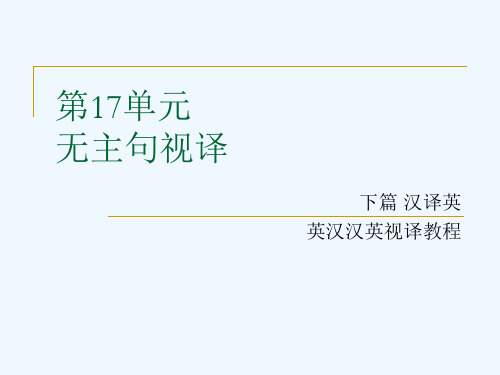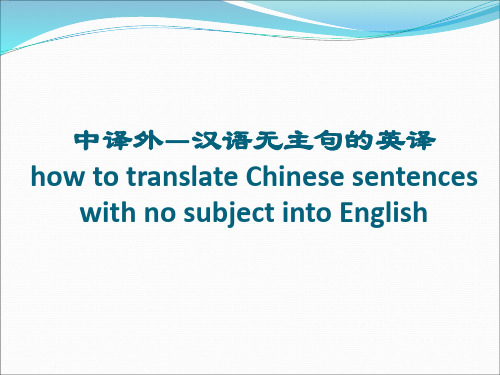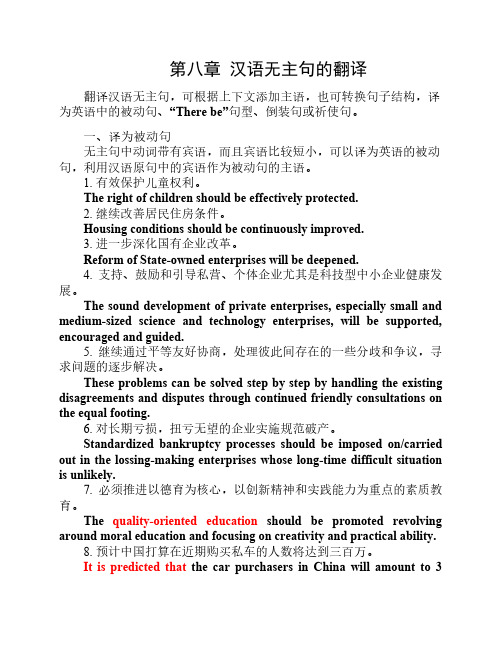汉语无主句的翻译
Unit 9 汉英对比与翻译(二)

Unit 9 汉语无主句的英译课时:2H教学目的要求:掌握汉语无主句的基本英译办法。
教学重点:翻译汉语无主句的几种技巧。
教学难点:如何使译文符合语法和语言使用规范。
教学内容:一、汉语祈使句译成英语祈使句1、起立!Stand up!2、请勿吸烟!No smoking!3、此处禁止停车!No parking!4、祖国万岁!Long live our motherland!二、采用英语的被动结构译出5、墙上挂了一些画。
Some pictures were hung on the wall.6、在合同中,详细地规定了双方必须履行的各种条件。
In the contract, all kinds of conditions which both sides should follow were laid down in detail.7、没有安定的政治环境,干什么都不成。
Nothing can be accomplished without a stable political environment.8、为什么总把这些麻烦事推给我呢?Why should all the unpleasant jobs be pushed on to me?三、采用倒装语序译出9、地下埋藏着大量的金、银、铜、铅和锌。
Hidden underground is a wealth of gold, silver, copper, lead and zinc.10、随着一声吼叫,呼地从树林里窜出一只老虎来。
Following the roar, out rushed a tiger from among the bushes.11、山里住着个虔诚的老和尚。
In the mountain lived an old devout monk.四、采用英语存在句there…be结构译出12、很多年以前,这个村子里住着六个盲人。
A long, long time ago, there lived six blind men in this village.13、剩下的时间不多了。
翻译三无主句译法

无主句译法Daisy XueI. 汉语无主句特点在汉语中,只有谓语部分而没有主语部分的句子叫做无主句。
这里所谓的无主句,并不是省略了主语的句子,而是在汉语习惯上就这么讲、这么写。
至于其主语到底是什么,往往很难确定。
但是这种句子在任何语言环境下都能表达完整明确的意思,如:“房子前面有一棵树,树下拴着一头老牛”,“刮风了,要下雨了”,“要吃什么,尽管跟我说”等等。
II. 翻译思路汉语句子中主语隐含或无主语时常可见。
译成英文必须依照英语的要求,将主语增补进来,或者另觅它途。
进行增补时首先要推敲语境,其次要考虑英语语法习惯和行文的需要.另觅它途时要考虑句子的功能以及和上下文的衔接情况。
构建翻译句子的整体框架。
确定译文整个句子中各个成分,尤其是确定以什么作为英语主语。
III. 翻译方法添加适当的代词或名词充当主语用“it”充当主语采用英语的被动结构译出采用“There be”结构译出汉语祈使句译成英语祈使句采用倒装语序译出将非主语成分转为主语A. Adding subjectsB. Using the empty subject “it”C. Translating into English passive sentencesD. Translating into English “there be”structureE. Translating into English imperative sentencesF. Translating into English inversionG. Converting the non-subject part into subjectA.Adding subjects添加适当的代词或名词充当主语Since an English sentence usually requires a subject, the translator can add the subject that is omitted in the Chinese original when he translates a Chinese subjectless sentence. For instance,你一旦开始,就必须继续下去。
翻译理论(汉译英)

六、表示谚语的无主句英译时可译为无主句,
亦可译为人称句,要视情况而定 a)三思而后行。 First think,then speak. b)入乡随俗 When in Rome,do as the Romans do. c)活到老,学到老。 One is never too old to learn. d)不入虎穴,焉得虎子。 He who would search for pearls must dive deep.Nothing venture, nothing have.
翻译理论(汉译英)
第一章汉语单句句型的翻译(一)
第一节 无主语的译法 无主句,顾名思义,就是没有主语的句子。
英语中除谚语外,只有省略了主语的祈使句为 无主句。而汉语中无主句却比比皆是,一般用 来表示自然现象、命令、谚语、存现、叙述等 意义。汉语的无主句翻译时常采用下列方式: 一、表示自然现象,时间,距离的无主句一般 译作英语的无人称句 英语的无人称句由“代词it”作主语,其表意 功能与汉语表自然现象、时间、距离的无主句 相同,翻译时常可对译。如:
汉语的动词无词形变化,而英语的非限定动词有不 定式与分词的区别,翻译英中必须注意宾补动词形式 的运用。“使、令”类兼语式的宾补多为不定式, 有的动词只能用分词作宾朴,有的不定式,分词皆 有,意思不同,须加区别使用。 如: a)不要让你妈一直等你。 Don't keep your mother waiting. b)这话使我们都笑了。 The words set us all laughing c)他觉得房子在摇动。 He felt the house shaking 1)当动词是“keep,catch,set,feel”等时。宾补 动词应用现在分词以表进行中的动作。
英汉汉英视译教程下篇汉译英第十七单元 无主句视译

第17单元 无主句视译 (例段)
【笔译】 So why do people buy a Transition rather than a luxury car and a used Cessna, the two of which would together prove cheaper than the $190,000 or so Terrafugia plans to charge? Who needs a flying car anyway?
第17单元 无主句视译 (例句)
4.应该注重对这种化学品对环境影响的研究。 【笔译】 We should strengthen the study of the chemical’s effects on the environment.
【视译】 Sufficient study should be conducted of the chemical’s effects on the environment.
第17单元 无主句视译 (例段)
【视译】 Several readers wrote to taunt me for not having anything to say on the London riots. As it happens, Chapter Five of my book is called “The New Britannia: The Deprived City”. You have to get up pretty early in the morning to beat me to Western civilization’s descent into barbarism.
汉语无主句的翻译方法

汉语无主句的翻译方法作者:刘子娟来源:《校园英语·下旬》2016年第08期【摘要】由于英汉两种语言在文化和思维方式上的差异,英语和汉语在句子结构上呈现出各自的特点。
一般而言英语句子必须有主语,而汉语句子具有松散性和开放性,句子意思的表达主要通过内部的逻辑关系来表达,因此有些汉语句子不需要主语。
本文主要阐几种述无主句翻译方法。
【关键词】无主句翻译主语英译技巧一、引言英汉两种语言在结构上存在着较大差异,英语是突出主语的语言,重形合;汉语是突出主题的语言,重意合。
因此在组句子时,英语首先要确定主语,因为主语是谓语讨论、描写和叙述的对象。
除了祈使句和某些惯用语里的主语可以省略,英语句子一般不能缺少主语。
汉语句子组织起来没有那么读的限制,有时不需要汉语主语。
因此在英译汉时确定主语是译入语灵活的关键。
二、翻译技巧1.增补主语。
汉语经常省略第一人称,在做汉语句子无主语英译时,可以适当的增补主语,例如we, they, you, things等。
例1.坚持扩大内需的方针,实施科教兴国和可持续发展战略。
译文:We should stick to the principle of stimulating domestic demand and implement the strategy of national rejuvenation through science and education and the strategy of sustainable.例2.不到长城非好汉。
He who has never been to the Great Wall is not a true man.例1和例2在汉译英时,分别通过增加主语we和he来满足英语结构的需要,符合英语表达习惯。
2.使用“there be” 结构。
汉语里,时间、地点短语可以放在句首充当话题,句中会出现“有、出现、发生”等表存在或出现意义的状态动词,在译成英语时可以使用“there be” 句型。
汉语无主句的翻译(讲义)

1.13无主句的翻译(P46-50)汉语里有众多的无主句,而英语里通常都用完整的句子。
翻译这类句子时,要根据不同的情况,有时要添加主语,有时要变换句型和句式。
1.译成被动句(1)译成原宾语做主语的被动句--- “by”引出做某事的人或东西,或介绍做某事的方法。
---“By”introduces what (or how) something is done by or method by which something is done.---为了确保乘客的人身安全,必须检查乘客随身携带的每一件行李。
---Each piece of luggage carried by the passengers must be examined to makesure of their safety.(2)译成“It +动词被动语态+(状语)+连接代词/连接副词+to do”或“It +动词被动语态+连接代词/连接副词引导的名词性从句”---是否在这里修建水坝还没有决定。
---It is not yet decided whether to build the dam here.---下次会议将讨论我们是否接受他的报价。
---It will be discussed at the next meeting whether we should accept his offer or not.---尚未决定何时交货。
---It’s not been settled yet when the goods should be delivered.(3)译成”There + 动词被动语态+主语+(状语)”译成引导词There后面使用及物动词被动语态,再接主语这样一种特殊形式。
---在离岸不远的地方可以找到那条船的一些线索。
---There can be found some remains of the wrecked ship near the shore.---世界上已经建造了一些了不起的机器来从受控核聚变中发电。
7-汉语无主句的英译

II. 增加主语
2. 增加 one, you, we, they, people 等作主语 1) 从太空观察地球,可以更深入地了解地球的构造,探 明地球的资源,预测地震、洪水、飓风、火山爆发、 海啸和其他自然灾害,可以保护人们的生命和财产。 探明资源(=勘探资源) explore resources 地震、洪水、飓风、火山爆发、海啸 earthquakes, floods, hurricanes, volcanic eruptions, tsunamis([su'nɑ:mi]) 自然灾害 natural disasters/calamities 注:catastrophe 大灾难, 程度比 disaster/calamity 深, 如 the catastrophe of a worldwide conflict
1) 人们的看法是旅游业将有助于促进中国人民和其 他国家人民之间的相互了解和友谊,并将有利于 文化、科学、技术方面的交流。还会有助于国家 增加收入。 The development of tourism, it is believed, will help promote mutual understanding and friendship between the peoples of China and other countries, and facilitate exchanges in the fields of culture, science and technology. Tourism also helps increase national revenue.
第八章 汉语无主句的翻译

第八章 汉语无主句的翻译翻译汉语无主句,可根据上下文添加主语,也可转换句子结构,译为英语中的被动句、“There be”句型、倒装句或祈使句。
一、译为被动句无主句中动词带有宾语,而且宾语比较短小,可以译为英语的被动句,利用汉语原句中的宾语作为被动句的主语。
1. 有效保护儿童权利。
The right of children should be effectively protected.2. 继续改善居民住房条件。
Housing conditions should be continuously improved.3. 进一步深化国有企业改革。
Reform of State-owned enterprises will be deepened.4. 支持、鼓励和引导私营、个体企业尤其是科技型中小企业健康发展。
The sound development of private enterprises, especially small and medium-sized science and technology enterprises, will be supported, encouraged and guided.5. 继续通过平等友好协商,处理彼此间存在的一些分歧和争议,寻求问题的逐步解决。
These problems can be solved step by step by handling the existing disagreements and disputes through continued friendly consultations on the equal footing.6. 对长期亏损,扭亏无望的企业实施规范破产。
Standardized bankruptcy processes should be imposed on/carried out in the lossing-making enterprises whose long-time difficult situation is unlikely.7. 必须推进以德育为核心,以创新精神和实践能力为重点的素质教育。
- 1、下载文档前请自行甄别文档内容的完整性,平台不提供额外的编辑、内容补充、找答案等附加服务。
- 2、"仅部分预览"的文档,不可在线预览部分如存在完整性等问题,可反馈申请退款(可完整预览的文档不适用该条件!)。
- 3、如文档侵犯您的权益,请联系客服反馈,我们会尽快为您处理(人工客服工作时间:9:00-18:30)。
汉语中有大量的无主句,它是十分常见的句式 之一。汉语无主句有着以下特征:
1. 语义简洁、明了、不拖 沓;
2. 虽然没有主语,但是,其主语要么是不言而喻的;要 么是在上下 文中已经表达明白了的;要么是泛指的 人或事物;要么是在语境中已经确定了 的;
1)剩下的水不多了。 There is very little water left.
2)萝卜青菜,各有所爱。 There is no accounting for taste.
3)无水则无鱼。 Without water there would be no fish.
三.采用倒装语序
有些表示事物存在,出现或消失的无主句,结 构形式与英语的倒装句相似,因此,在汉译英 时用倒装语序往往十分得体的。
下列动词的主动语态表示被动意义,而且常与 well,quite,easily,badly等副词连用。它们是: wash,sell,read,wear,blame,ride,write。
二.译成英语的存在句there be
汉语中的某些格言、经验,或带有哲理的无主句,翻译时 一般都采用这类结构。例如:
3. 在诸如公文体、科技体等正式语体中无主句大量使用; 4. 书面语的无主句常常具有严肃性、权威性的特点; 5. 指令性(含禁令性)语句,大量使用无主句加以表
达。
(新编汉英翻译教程,2004;129)
汉语无Байду номын сангаас句的英译法大致有以下几种
运用英语的被动结构 译成英语的存在句there be 运用倒装句式 采用祈使句式 采用形式主语it 适当主语的增补 具体问题具体对待
语态选择中注意以下这两点
有一些动词和词组不能用于被动语态。它们是: come true,consist of,take place,happen, become,rise,occur,belong,break out, appear,arrive,die,fall,last,exist,fail, succeed等。
汉语无主句的翻译
无主句是现代汉语语法的术语,是非主谓句 的一种,是指根本没有主语的句子。这种句 子的作用在于描述动作、变化等情况,而不 在于叙述“谁”或者“什么”进行这一动作 或发生这个变化。
无主句不同于主谓句中省略主语或者隐含主语 的句子,它的主语往往是不确定的,如“上课 了!”或者根本无法补充出主语,如“下雨 了。”
例如:
1)地下埋藏着大量的金、银、铜、铅和锌。 Hidden underground is a wealth of gold, silver, copper, lead and zinc.
2)随着一声吼叫,呼地从树林里窜出一只狮 子来。
Following the roar, out rushed a lion from among the bushes. 3)寺庙里住着一个虔诚的老和尚。 In the temple lived an old devout monk.
一.运用英语的被动结构
(一)某些表示事物存在、出现的无主句, 可以译成被动句。例如:
(1) 这儿将修建更多的居民大楼。 More apartment houses will be built here. (2) 去年发现了一种稀有元素。 A rare element was found last year.
(二)某些表示要求、规定的无主句,也往往 可以译成被动句。
例如: (1)本剧场内禁止吸烟。
Smoking is not allowed in the theatre. (2) 发现了错误,一定要改正。
Wrongs must be righted when they are discovered. (3) 必须保证八小时睡眠。 Eight hours’ sleep must be guaranteed.
